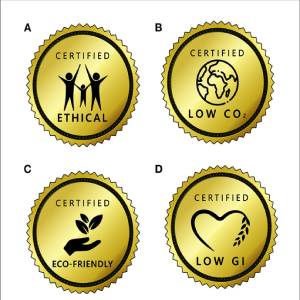
Ethical labels serve the purpose of distinguishing products or services that have been produced in an ethically responsible manner. These labels signify that an item has been manufactured with environmentally friendly methods and meets particular sustainability criteria. By providing this information, ethical labels empower individuals to make informed choices based on their moral values when it comes to consumption. Moreover, these labels are employed by governing bodies as a means of influencing consumer behavior and shaping societal progress in alignment with desired objectives.
How Big is the Global Ethical Labels Market?
The global ethical labels market size reached US$ 999 Billion in 2022. Looking forward, IMARC Group expects the market to reach US$ 1,487 Billion by 2028, exhibiting a growth rate (CAGR) of 6.8% during 2023-2028. The increasing preference for ready-to-eat (RTE) food products, integration of advanced technologies, and initiatives undertaken by governing agencies represent some of the key factors driving the market.
Global Ethical Labels Market Trends:
The primary driving force behind the ethical labels market is the increasing concern for food safety, hygiene, and reliability. Additionally, the market is experiencing growth due to shifting consumer preferences for ready-to-eat (RTE) food products. Factors such as rising urbanization levels, a growing working population, hectic schedules, and increased purchasing power of individuals contribute to this trend. The adoption of technologies like blockchain, RFID chips, GPS, AI, and ML in ethical labels is improving transparency and traceability in supply chains, further fueling market growth. Advancements in ethical labels, such as providing information about production conditions and analyzing data to address moral and sustainability concerns, are also contributing to market expansion. Moreover, the incorporation of sensors in these labels to gather environmental data and verify sustainability claims is positively impacting the global market. Furthermore, government bodies in many countries are promoting sustainable farming practices, which is expected to drive the ethical labels market in the future.
Download your free sample brochure: https://www.imarcgroup.com/ethical-labels-market/requestsample
What is included in market segmentation?
The report has segmented the market into the following categories:
Product Type Insights:
• Foods
• Beverages
The report has provided a detailed breakup and analysis of the ethical labels market based on the product type. This includes foods and beverages. According to the report, foods represented the largest segment.
Label Type Insights:
• Halal
• Organic
• Clean
• Sustainability and Fairtrade labels
• Kosher
• Animal Welfare Labels
• Vegan Labels
A detailed breakup and analysis of the ethical labels market based on the label type has also been provided in the report. This includes halal, organic, clean, sustainability and fairtrade labels, kosher, animal welfare labels, and vegan labels. According to the report, halal accounted for the largest market share.
Distribution Channel Insights:
• Online
• Offline
The report has provided a detailed breakup and analysis of the ethical labels market based on the distribution channel. This includes online and offline. According to the report, offline represented the largest segment.
Regional Insights:
• North America
o United States
o Canada
• Asia-Pacific
o China
o Japan
o India
o South Korea
o Australia
o Indonesia
o Others
• Europe
o Germany
o France
o United Kingdom
o Italy
o Spain
o Russia
o Others
• Latin America
o Brazil
o Mexico
o Others
• Middle East and Africa
The report has also provided a comprehensive analysis of all the major regional markets that include North America (the United States and Canada), Asia Pacific (China, Japan, India, South Korea, Australia, Indonesia, and others), Europe (Germany, France, United Kingdom, Italy, Spain, Russia, and others), Latin America (Brazil, Mexico, and others), and the Middle East and Africa. According to the report, Asia Pacific was the largest market for ethical labels. Some of the factors driving the Asia Pacific ethical labels market included the rising awareness among consumers, increasing popularity of packaged food, favorable regulations from governing agencies, etc.
Who are the key players operating in the industry?
The report covers the major market players including:
Abbot’s Butcher Inc., Archer-Daniels-Midland Company, Cargill Inc., Garden of Life (Nestlé S.A.), Go Macro LLC, Kerry Group plc, Koninklijke DSM N.V., Marks and Spencer Group plc, The Hershey Company, etc.
Contact Information:
IMARC Group 134 N 4th St. Brooklyn, NY 11249, USA USA: +1-631-791-1145 | Asia: +91-120-433-0800 Email: [email protected] Follow us on Twitter: @imarcglobal LinkedIn: https://www.linkedin.com/company/imarc-group/mycompany/
Tags:
IPS, iCN Internal Distribution, Extended Distribution, Research Newswire, English